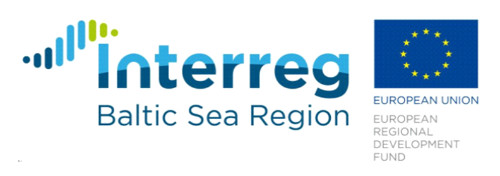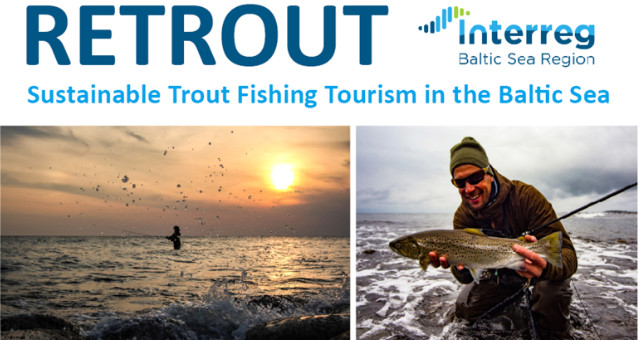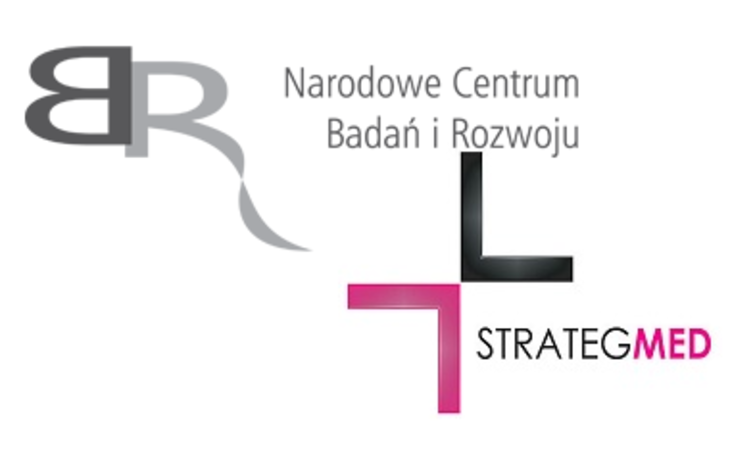Projekty unijne i krajowe
1. DEVELOPMENT, PROMOTION AND SUSTAINABLE MANAGEMENT OF THE BALTIC SEA REGION AS A COASTAL TOURISM DESTINATION (RETROUT)

Duration: October 2017 - September 2020
Partners: County Administrative Board in Stockholm, Royal Institute of Technology and Haninge municipality in Sweden, Baltic Environmental Forum Estonia, University of Tartu and NGO Estonian Fishing Tourism in Estonia, Kurzeme Planning Region, Institute of Food Safety, Animal Health and Environment - “BIOR” and Ventspils Regional Municipality in Latvia, Klaipeda University and Fishery service under the ministry of Agriculture of the republic of Lithuania in Lithuania, National Marine Fisheries Research Institute and EU-CONSULT Sp. z o.o. in Poland and Baltic Marine Environment Protection Commission HELCOM in Finland
Total budget: 3,221,336.40€
European Regional Development Fund: 2,620,136.21€
Project no.: #R065
Information about project:
The coastal fishing tourism industry in the BSR has been identified as a sector with great potential for growth and sustainable jobs. It offers opportunities for rural jobs, diversification of the fishery sector and prolonged tourism season. However, in order to fully exploit the economic potential, there is a need to address the key challenges currently limiting the development of the sector, explicitly:
- Weak capacity of the fishing tourism sector to meet the customers’ demand.
- Weak governance framework that in many cases is counter-productive for fishing tourism.
- Weak management of ecosystem services, to underpin the fishing tourism industry.
The project aims at enabling the target groups to develop and promote sustainable coastal fishing tourism and simultaneously advance integrated implementation of CFP, WFD, MSFD and HELCOM recommendations, by addressing these key challenges.
The target groups, identified as instrumental to leverage this tourism sector, are SMEs (sport fishing service providers, fishing guides) and their associations, regional authorities, coastal municipalities, and tourist boards.
These target groups will benefit from the main project outputs i.e.:
- STRATEGIC DEVELOPMENT PLANS FOR NEWTOURISMPRODUCT AT 5 DEMONSTRATION SITES, to be used as planning documents for post-project activities and to attract new financial resources by the local clusters.
- MODEL PROCESS FOR DESTINATION DEVELOPMENT FOR COASTAL FISHINGTOURISM, to be used as educational product by key target groups - fishing/fisheries associations and coastal municipalities.
- THE BALTIC TROUT DESTINATION MANAGEMENT SERVICE. The joint eco-branding and web-portal for on-line marketing and booking services will improve market access and performance of the transnational network of fishing guides, tourist boards and coastal municipalities.
- TRANSNATIONAL ACTION PLAN FOR FISHINGTOURISM, which will provide guidance to the national authorities to foster sustainable growth and jobs through appropriate policy and regulatory adjustments.
- "BEST PRACTICE” SOLUTIONS FOR EFFICIENT RIVER RESTORATION MEASURES FOR SEATROUT, disseminated through the demonstration projects and the Baltic Toolbox on River Restoration, which will provide guidance to national and regional authorities, on best practice (e.g. on communication) and restoration solutions that enhance eco-system health, are economically viable and efficient for production of fish stocks.

»Pobierz wersję PL
» Wybór wykonawcy
2. Projekt „Nowe związki o działaniu przeciwnowotworowym zaburzające funkcje telomerów” (TARGETTELO) - dofinansowanie z Programu STRATEGMED (Narodowe Centrum Badań i Rozwoju)
Projekt pt. "Nowe związki o działaniu przeciwnowotworowym zaburzające funkcje telomerów" jest realizowany w konsorcjum. Obok lidera (Politechniki Gdańskiej) w projekcie uczestniczą jako partnerzy konsorcjum projektowego: Uniwersytet Gdański, Gdański Uniwersytet Medyczny, Instytut Immunologii i Terapii Doświadczalnej im. Ludwika Hirszfelda Polskiej Akademii Nauk z Wrocławia, Instytut Biologii Doświadczalnej im. M. Nenckiego Polskiej Akademii Nauk z Warszawy, Szpitale Wojewódzkie w Gdyni, firmy Innovabion oraz EU-CONSULT.
Opis projektu: "Jest to duży projekt interdyscyplinarny w dziedzinie onkologii. Celem projektu jest otrzymanie nowego związku (jeden, dwa) o działaniu przeciwnowotworowym. Związki te mają działać na nowe cele molekularne jakimi są układy telomerowe. Trzy strategie zostaną zaproponowane w ramach których faza projektowania, syntezy, ewaluacji in vitro i następnie in vivo i ex vivo będą miały miejsce. W sumie planujemy wykorzystać trzy cele molekularne (w tym dwa zupełnie nowe) w obrębie telomerów. W końcowym efekcie oczekujemy, że jeden lub dwa związki o pożądanych właściwościach przeciwnowotworowych i niskiej toksyczności zostaną wyselekcjonowane i mogą stać się przedmiotem komercjalizacji. Projekt w dużej części oparty jest na wstępnych rezultatach i jest bardzo innowacyjny, gdyż dwa z trzech celów molekularnych nie były wcześnie wykorzystywane w chemoterapii przeciwnowotworowej a faza wstępna projektowania będzie intensywnie wsparta metodami in silico. Poza tym jak do tej pory wogóle nie udało się otrzymać leków działających na układy telomerowe co podnosi rangę ewentualnego sukcesu. Politechnika Gdańska będzie liderem projektu, ze względu na wkład intelektualny. Partner zaś przemysłowy (firma EU-consult) będzie głównym strategicznym partnerem w komercjalizacji potencjalnego nowego leku." (Źródło:https://mostwiedzy.pl/pl/business/project/nowe-zwiazki-o-dzialaniu-przeciwnowotworowym-zaburzajace-funkcje-telomerow,449-1)
Wysokośc przyznanego dofinansowania: 19,6 mln zł.


